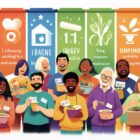Seven Ways Non-profits Enhance Snap Benefits Access

Did you know that millions of eligible individuals and families in the United States are not accessing the Supplemental Nutrition Assistance Program (SNAP) benefits they qualify for?
Fortunately, non-profit organizations are stepping up to bridge this gap. In this article, we will explore seven ways these organizations are enhancing access to SNAP benefits.
From simplifying the application process to advocating for policy changes, these initiatives are empowering individuals and ensuring that everyone has access to the assistance they need.
Key Takeaways
- Non-profits simplify the application process for SNAP benefits by providing assistance with completing paperwork, offering application workshops, and helping gather required documentation.
- Non-profits provide personalized guidance to individuals, assessing eligibility, assisting with completing applications accurately, and offering ongoing support throughout the process.
- Collaboration with community partners allows non-profits to reach more individuals and tap into additional resources and expertise.
- Non-profits educate and empower applicants through workshops, training sessions, online resources, and financial literacy education. They also advocate for policy changes to improve SNAP benefits access.
Simplifying the Application Process
Simplify your application process for SNAP benefits by utilizing non-profit resources.
Non-profit organizations play a vital role in enhancing access to SNAP benefits and streamlining the application process. They offer a range of services and resources that can make applying for SNAP benefits easier and more efficient.
One way non-profits simplify the application process is by providing assistance with completing the necessary paperwork. They have knowledgeable staff members who can guide you through the application, ensuring that all required information is accurately filled out. This helps minimize errors and reduces the chances of your application being delayed or denied.
Additionally, non-profits often offer application workshops and clinics where you can receive personalized assistance. These sessions provide an opportunity to ask questions, clarify any doubts, and get step-by-step guidance on how to complete the application correctly. By attending these workshops, you can ensure that your application is submitted accurately and promptly.
Furthermore, non-profits can assist with gathering the required documentation for your SNAP application. They can help you understand what documents are needed and can even provide support in obtaining them. This saves you time and effort, as you won’t have to navigate the process alone.
Providing Personalized Guidance
One key way non-profits enhance SNAP benefits access is by offering personalized guidance throughout the application process. This guidance can be instrumental in helping individuals understand the requirements, gather the necessary documentation, and navigate the sometimes complex application forms. Here are five ways non-profits provide personalized guidance:
- Assessment: Non-profits assess individuals’ eligibility for SNAP benefits, providing them with a clear understanding of their potential eligibility and the benefits they may receive.
- Application Assistance: Non-profits help applicants complete their SNAP application accurately and efficiently, ensuring all required information is included.
- Document Preparation: Non-profits assist individuals in gathering the necessary documents to support their SNAP application, such as income statements, proof of residency, and identification documents.
- Follow-Up Support: Non-profits offer ongoing support to applicants, answering questions, addressing concerns, and providing updates on the status of their application.
- Appeals Assistance: In cases where an application is denied, non-profits provide guidance and support to individuals throughout the appeals process, helping them present their case effectively.
By providing personalized guidance, non-profits empower individuals to navigate the SNAP application process with confidence and increase their chances of accessing the benefits they need.
This personalized approach sets the stage for effective collaboration with community partners, which we’ll discuss in the next section.
Collaborating With Community Partners
Collaborating with community partners strengthens non-profit efforts to enhance SNAP benefits access. By working together with local organizations, non-profits can reach a broader audience and provide more comprehensive support to individuals and families in need. The table below highlights five key benefits of collaborating with community partners:
| Benefit | Description |
|---|---|
| 1. Increased Outreach | Community partners have established connections and networks within the local community, enabling non-profits to reach individuals who may not be aware of SNAP benefits or how to access them. By leveraging these partnerships, non-profits can expand their reach and ensure that eligible individuals are informed about available resources. |
| 2. Enhanced Resources | Collaborating with community partners allows non-profits to tap into additional resources, such as funding, volunteers, and expertise. These partnerships can provide non-profits with the support they need to expand their services and improve the overall SNAP benefits access experience for their clients. |
| 3. Targeted Assistance | Community partners often have a deep understanding of the specific challenges and barriers faced by the local population. By working together, non-profits can tailor their outreach and support efforts to address these unique needs, ensuring that individuals receive the assistance they require. |
| 4. Streamlined Referrals | Community partners can serve as a valuable resource for non-profits by providing referrals to other organizations that offer complementary services. This collaboration streamlines the process for individuals seeking assistance, ensuring that they are connected to the appropriate resources quickly and efficiently. |
| 5. Knowledge Exchange | Collaborating with community partners fosters a culture of knowledge exchange, allowing non-profits to learn from the expertise and experience of their partners. This shared learning can lead to improved strategies and approaches for enhancing SNAP benefits access, ultimately benefiting the entire community. |
Educating and Empowering Applicants
To improve SNAP benefits access, non-profits focus on educating and empowering applicants. By providing valuable information and resources, non-profits ensure that individuals have the knowledge and tools necessary to navigate the application process successfully. Here are five ways non-profits are educating and empowering SNAP applicants:
- Workshops and Training: Non-profits offer workshops and training sessions to help applicants understand the eligibility criteria, application process, and available resources.
- One-on-One Assistance: Through personalized assistance, non-profits guide applicants in completing the application accurately and efficiently, addressing any questions or concerns along the way.
- Online Resources: Non-profits create online platforms and resources that provide comprehensive information about SNAP benefits, including frequently asked questions, step-by-step guides, and self-assessment tools.
- Outreach Programs: Non-profits actively engage in community outreach programs, ensuring that individuals are aware of the SNAP program and its benefits, and empowering them to take advantage of the assistance available.
- Financial Literacy Education: Non-profits offer financial literacy education to SNAP applicants, equipping them with the knowledge and skills needed to make informed decisions about budgeting and managing their benefits effectively.
Advocating for Policy Changes
Advocate for policy changes to improve SNAP benefits access by actively engaging with decision-makers and presenting evidence-based arguments. Non-profit organizations play a crucial role in advocating for policy changes that can enhance the accessibility and effectiveness of SNAP benefits. By actively engaging with decision-makers, non-profits can bring attention to the challenges faced by SNAP applicants and recipients, and propose solutions to address these issues.
One way non-profits advocate for policy changes is by conducting research and gathering data that supports their claims. By collecting and presenting evidence-based arguments, non-profits can effectively demonstrate the need for policy changes that can improve SNAP benefits access. This can include data on the impact of current policies on vulnerable populations, the barriers faced by applicants and recipients, and the potential benefits of proposed changes.
Non-profits also collaborate with other organizations and form coalitions to amplify their advocacy efforts. By joining forces with like-minded organizations, non-profits can increase their influence and present a united front when advocating for policy changes. This can include reaching out to other non-profits, community organizations, and even government agencies to build partnerships and create a collective voice for change.
In addition to engaging decision-makers through research and collaboration, non-profits also participate in public hearings, town hall meetings, and other public forums to raise awareness about the need for policy changes. By speaking directly to decision-makers and the public, non-profits can educate and inform individuals about the challenges faced by SNAP applicants and recipients, and mobilize support for their cause.
Furthermore, non-profits use various advocacy strategies, such as grassroots organizing, media campaigns, and social media engagement, to increase visibility and generate public support for policy changes. By utilizing these strategies, non-profits can reach a wider audience and build momentum for their advocacy efforts.
Advocating for policy changes requires persistence and a long-term commitment. Non-profits must continuously monitor policy developments, engage decision-makers, and adapt their strategies to effectively advocate for SNAP benefits access. Through their advocacy efforts, non-profits can contribute to meaningful policy changes that enhance the accessibility and effectiveness of SNAP benefits for those who need them most.
Frequently Asked Questions
What Are the Income Eligibility Requirements for SNAP Benefits?
You’re wondering about the income eligibility requirements for SNAP benefits. Well, the requirements vary depending on factors like household size and income. It’s important to meet these criteria to qualify for assistance.
How Long Does It Usually Take for a SNAP Application to Be Processed?
It usually takes about 30 days for a SNAP application to be processed. However, processing times can vary depending on factors like the state you live in and the complexity of your application.
Are There Any Restrictions on What Can Be Purchased With SNAP Benefits?
Yes, there are restrictions on what can be purchased with SNAP benefits. Eligible items include fruits, vegetables, dairy products, meats, and bread. Non-food items like alcohol, tobacco, vitamins, and hot prepared foods are not eligible.
Can Non-Citizens or Immigrants Qualify for SNAP Benefits?
Yes, non-citizens or immigrants can qualify for SNAP benefits if they meet certain criteria. Despite concerns about eligibility, the program aims to provide assistance to those in need, regardless of their citizenship status.
What Happens if My SNAP Application Is Denied? Is There an Appeal Process?
If your SNAP application is denied, there is an appeal process available. You can request a fair hearing within a certain timeframe, where you can present evidence and arguments to support your case.



